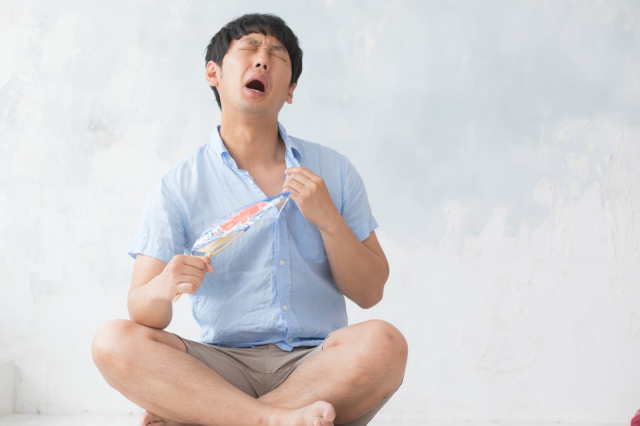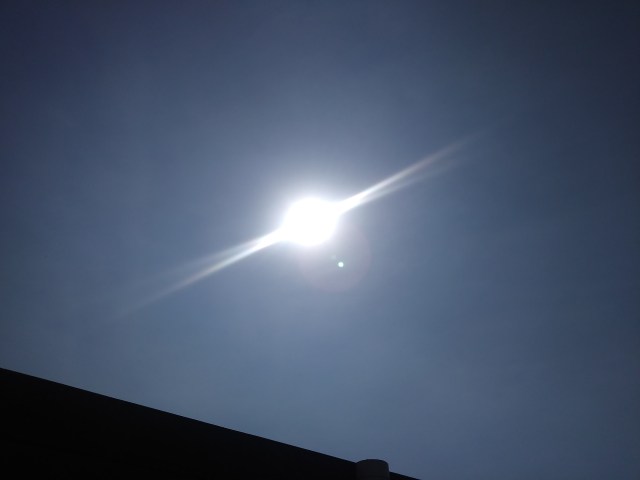
Japan’s national and Tokyo temperature records fall on the same day as intense heat wave continues.
There was already plenty of anecdotal evidence that this summer in Japan is extremely hot. The scorching temperatures have caused schoolgirls to need hospitalization, meat to cook on car roofs, and even the country’s ordinarily industrious mosquitoes to say, “You know what? Let’s take a break from sucking people’s blood and just relax instead.”
And now there’s numerical evidence of 2018’s heat as well. At 2:16 in the afternoon on Monday, July 23, the Japan Meteorological Agency observed a temperature of 41.1 degrees Celsius (106 degrees Fahrenheit) in the city of Kumagaya, Saitama Prefecture (Tokyo’s neighbor to the north), which is the highest temperature ever recorded in Japan. The previous record was held by Ekawasaki, a town in Kochi Prefecture on the island of Shikoku, which hit 41 degrees flat back in August of 2012.
On the same afternoon Tokyo’s regional record fell as well. Ome, a district in the northwest of the capital and not far from the border with Saitama, experienced temperatures as high as 40.8 degrees Celsius by 2 p.m., which is the first time ever for a temperature above 40 degrees to be observed in Tokyo.
▼ The sun on July 23, desperately trying to melt east Japan, or at least turn it into a crispy senbei rice cracker
Unfortunately, these potentially dangerous conditions come right as the peak summer travel season starts, with school out for both kids in Japan and many foreign countries, prompting groups both domestic and international to head out to Japan’s most popular sightseeing destinations. Making things especially difficult is that this is also an unusually dry summer for Japan, and the lower humidity can sometimes create the illusion that it’s not as hazardously hot as it actually is.
So if you’re out and about in Japan, make sure to drink plenty of fluids (the oddly named yet delicious sports drink Pocari Sweat, and its rival Aquarius, can be found in any convenience store), slather on the sunscreen (which is hiyakedome in Japanese, in case you need to ask for help finding it at the drugstore), and watch out for dehydration.
Sources: NHK News Web (1, 2) via Jin (1, 2), Weather News via Hachima Kiko
Top image: Pakutaso
Insert images ©SoraNews24
Follow Casey on Twitter, where he’s not complaining about the heat because he used up all his gripping privileges complaining about the cold in the winter.


 Japan just had its hottest day ever in its recorded history
Japan just had its hottest day ever in its recorded history Japan’s hottest city uses its scorching record to boost tourism
Japan’s hottest city uses its scorching record to boost tourism It’s so hot in Japan that people are cooking food in/on their cars【Photos】
It’s so hot in Japan that people are cooking food in/on their cars【Photos】 We cook a monjayaki Japanese pancake on the hood of a car during Japan’s hottest summer ever【Vid】
We cook a monjayaki Japanese pancake on the hood of a car during Japan’s hottest summer ever【Vid】 Japan Weather Association creates new words to describe merciless summer heat
Japan Weather Association creates new words to describe merciless summer heat Huge Evangelion Unit-01 head appearing in lights in Japan to celebrate anime’s 30th anniversary
Huge Evangelion Unit-01 head appearing in lights in Japan to celebrate anime’s 30th anniversary Is China’s don’t-go-to-Japan warning affecting the lines at a popular Tokyo gyukatsu restaurant?
Is China’s don’t-go-to-Japan warning affecting the lines at a popular Tokyo gyukatsu restaurant? Ramen shop manager arrested for punching self in the face and pretending he was robbed
Ramen shop manager arrested for punching self in the face and pretending he was robbed McDonald’s Japan partners with anime English teacher, but did they commit a cultural error?[Video]
McDonald’s Japan partners with anime English teacher, but did they commit a cultural error?[Video] 10 great quirky museums to beat the Japan rainy season blues
10 great quirky museums to beat the Japan rainy season blues Naruto jerseys coming to Major Leage Baseball theme nights, Hello Kitty to take over a field
Naruto jerseys coming to Major Leage Baseball theme nights, Hello Kitty to take over a field Ghost in the Sheel goes traditional with Japanese porcelain Tachikoma robots, only 50 to be made
Ghost in the Sheel goes traditional with Japanese porcelain Tachikoma robots, only 50 to be made Japanese interior micro-houses and study spaces: Great for work-at-home professionals, kids too
Japanese interior micro-houses and study spaces: Great for work-at-home professionals, kids too Chocolate Totoro cream puffs and cakes coming to Japan’s Ghibli bakery for Valentine’s Day【Pics】
Chocolate Totoro cream puffs and cakes coming to Japan’s Ghibli bakery for Valentine’s Day【Pics】 Trouble making friends? Sticker collecting works surprisingly well
Trouble making friends? Sticker collecting works surprisingly well Yokai are descending upon Tokyo this spring in the latest immersive art experience
Yokai are descending upon Tokyo this spring in the latest immersive art experience New Studio Ghibli stamps leave an impression on your stationery…and your heart
New Studio Ghibli stamps leave an impression on your stationery…and your heart Cherry blossom forecasts map shows Japan’s OTHER sakura season is starting right now
Cherry blossom forecasts map shows Japan’s OTHER sakura season is starting right now Japan cherry blossom forecast update moves up sakura dates for many parts of the country
Japan cherry blossom forecast update moves up sakura dates for many parts of the country Morning-after pill finally available in Japan without a prescription, must be taken at pharmacy
Morning-after pill finally available in Japan without a prescription, must be taken at pharmacy Japanese women sound off on their minimum height requirements for a husband【Survey】
Japanese women sound off on their minimum height requirements for a husband【Survey】 Japan has a new bar just for people thinking about quitting their jobs, and the drinks are free
Japan has a new bar just for people thinking about quitting their jobs, and the drinks are free Japanese man gets drunk and falls asleep on Tokyo streets, then gets robbed by foreign national
Japanese man gets drunk and falls asleep on Tokyo streets, then gets robbed by foreign national And now, we eat a bear paw we bought in Japan’s Chiba Prefecture【Taste test】
And now, we eat a bear paw we bought in Japan’s Chiba Prefecture【Taste test】 Starbucks Japan releases new drinkware and goods for Valentine’s Day
Starbucks Japan releases new drinkware and goods for Valentine’s Day Japan releases first official sakura cherry blossom forecast for 2026
Japan releases first official sakura cherry blossom forecast for 2026 10 times to avoid traveling in Japan in 2026
10 times to avoid traveling in Japan in 2026 Archfiend Hello Kitty appears as Sanrio launches new team-up with Yu-Gi-Oh【Pics】
Archfiend Hello Kitty appears as Sanrio launches new team-up with Yu-Gi-Oh【Pics】 Starbucks Japan releases new Frappuccino and latte for Valentine’s Day
Starbucks Japan releases new Frappuccino and latte for Valentine’s Day China’s don’t-go-to-Japan warning looks to be affecting tourist crowds on Miyajima
China’s don’t-go-to-Japan warning looks to be affecting tourist crowds on Miyajima Our 52-year-old pole dancing reporter shares his tips for achieving your New Year’s exercise goal
Our 52-year-old pole dancing reporter shares his tips for achieving your New Year’s exercise goal Studio Ghibli releases new “komorebi” plush toys from Princess Mononoke and Spirited Away
Studio Ghibli releases new “komorebi” plush toys from Princess Mononoke and Spirited Away Ramen restaurant’s English menu prices are nearly double its Japanese ones, denies discriminating
Ramen restaurant’s English menu prices are nearly double its Japanese ones, denies discriminating Survey asks foreign tourists what bothered them in Japan, more than half gave same answer
Survey asks foreign tourists what bothered them in Japan, more than half gave same answer Japan’s human washing machines will go on sale to general public, demos to be held in Tokyo
Japan’s human washing machines will go on sale to general public, demos to be held in Tokyo We deeply regret going into this tunnel on our walk in the mountains of Japan
We deeply regret going into this tunnel on our walk in the mountains of Japan Studio Ghibli releases Kodama forest spirits from Princess Mononoke to light up your home
Studio Ghibli releases Kodama forest spirits from Princess Mononoke to light up your home Major Japanese hotel chain says reservations via overseas booking sites may not be valid
Major Japanese hotel chain says reservations via overseas booking sites may not be valid Put sesame oil in your coffee? Japanese maker says it’s the best way to start your day【Taste test】
Put sesame oil in your coffee? Japanese maker says it’s the best way to start your day【Taste test】 No more using real katana for tourism activities, Japan’s National Police Agency says
No more using real katana for tourism activities, Japan’s National Police Agency says Starbucks Japan reveals new sakura drinkware collection, inspired by evening cherry blossoms
Starbucks Japan reveals new sakura drinkware collection, inspired by evening cherry blossoms Updated cherry blossom forecast shows extra-long sakura season for Japan this year
Updated cherry blossom forecast shows extra-long sakura season for Japan this year Tokyo too hot for you? It’s already snowing in Hokkaido, Japan’s northern island【Photos】
Tokyo too hot for you? It’s already snowing in Hokkaido, Japan’s northern island【Photos】 Japan’s intense heat wave has killed 79 people in Tokyo
Japan’s intense heat wave has killed 79 people in Tokyo Summer in Japan doesn’t feel like a Japanese summer this year, many are saying
Summer in Japan doesn’t feel like a Japanese summer this year, many are saying This is the best summer in years to visit Japan…if you hate mosquitoes
This is the best summer in years to visit Japan…if you hate mosquitoes Tokyo’s riot cops finally win right to carry drinks on duty during Japan’s hottest summer ever
Tokyo’s riot cops finally win right to carry drinks on duty during Japan’s hottest summer ever Japanese summer is worse than summer in Death Valley, says our correspondent, a seasoned traveler
Japanese summer is worse than summer in Death Valley, says our correspondent, a seasoned traveler Japan’s new wearable air conditioner belt is here just in time for the Tokyo heat wave
Japan’s new wearable air conditioner belt is here just in time for the Tokyo heat wave What colors of clothing will keep you cooler in summer? Japanese researchers experiment
What colors of clothing will keep you cooler in summer? Japanese researchers experiment Tokyo Disney Resort’s low park attendance continues amid extreme heat
Tokyo Disney Resort’s low park attendance continues amid extreme heat 10 girls rushed to hospital for heatstroke after Tokyo high school’s non-air-conditioned assembly
10 girls rushed to hospital for heatstroke after Tokyo high school’s non-air-conditioned assembly Tokyo loses 2020 Olympic marathon as IOC shifts race to another part of Japan
Tokyo loses 2020 Olympic marathon as IOC shifts race to another part of Japan Very smart, funny cat shows exactly what it feels like to go outside in Japan’s heat wave【Video】
Very smart, funny cat shows exactly what it feels like to go outside in Japan’s heat wave【Video】 Not so fun in the sun – Cases of heatstroke hit a year-high last week in Japan
Not so fun in the sun – Cases of heatstroke hit a year-high last week in Japan
Leave a Reply